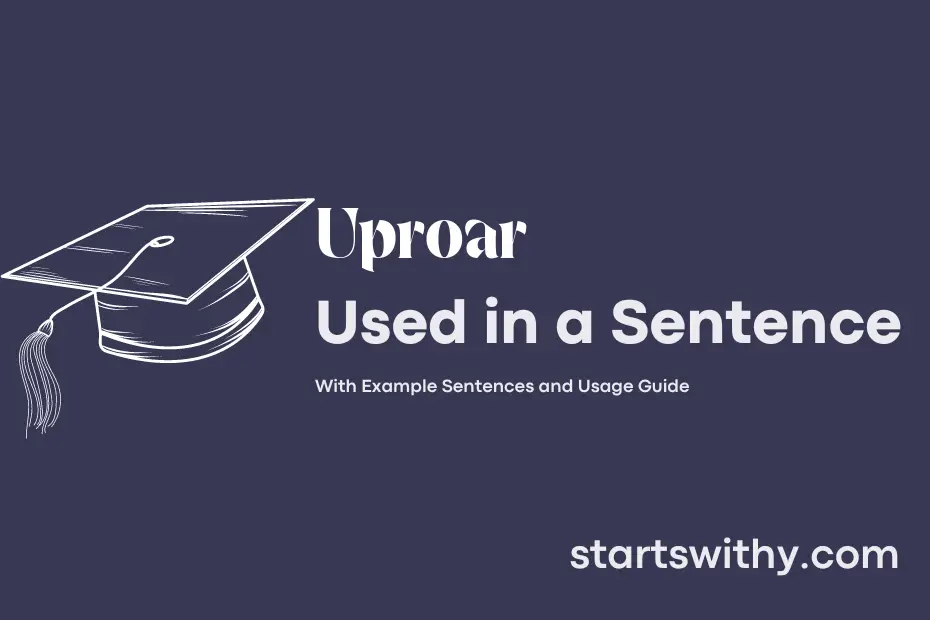Do you know what the word “uproar” means? An uproar refers to a loud and chaotic situation where there is a lot of noise, commotion, and confusion.
Imagine a setting where voices are raised, people are shouting, and the atmosphere is tense with excitement or anger. This level of noise and disruption is an uproar.
7 Examples Of Uproar Used In a Sentence For Kids
- Is that a uproar I hear outside?
- The children made an uproar during playtime.
- The teacher asked the class to quiet down the uproar.
- Let’s all join in the uproar and have fun together!
- The uproar of laughter filled the classroom.
- We had an uproar of excitement at the school assembly.
- Don’t be afraid of the uproar, it’s just the sound of happiness!
14 Sentences with Uproar Examples
- Uproar broke out in the cafeteria when the student council announced a sudden increase in meal plan prices.
- Students caused an uproar in the library when they found out that the Wi-Fi wasn’t working.
- The cancellation of the annual college fest caused quite an uproar among the student body.
- An uproar ensued during the exam when a professor accused a student of cheating.
- The decision to ban outside food in the hostel led to a massive uproar among the residents.
- There was an uproar in the auditorium when the guest speaker failed to show up on time.
- The sudden closure of the popular hangout spot near the campus caused an uproar among the regulars.
- The news of the final year exams being postponed sparked an uproar among the graduating students.
- The announcement of a strict dress code for the upcoming college function created an uproar among the fashion-conscious students.
- An uproar erupted in the hostel when the water supply to the building was cut off without prior notice.
- The decision to cancel the annual college trip caused an uproar among the students who were looking forward to it.
- An uproar broke out during the college election campaign as opposing parties clashed over their policies.
- Students created an uproar in the computer lab when the printers malfunctioned during project submission week.
- The news of a sudden increase in hostel fees resulted in an uproar among the residents who were already struggling to make ends meet.
How To Use Uproar in Sentences?
To use Uproar in a sentence, you should begin by identifying a situation that involves a lot of noise, commotion, or uproarious activity. Uproar is typically used to describe a state of chaos or disorder that is accompanied by loud and disruptive behavior.
For example, you could say, “There was an uproar in the classroom when the fire alarm went off unexpectedly.” In this sentence, uproar is used to convey the sense of confusion and noise that occurred in the classroom.
Another way to use uproar in a sentence is to describe a situation where there is a great deal of controversy or public outcry. For instance, you might say, “The government’s decision to increase taxes caused a major uproar among the citizens.” Here, uproar is used to show the strong negative reaction and outrage from the people.
When using uproar in a sentence, it is important to consider the context and tone of the situation. Make sure the word fits the level of chaos or disturbance you are trying to convey in your sentence.
In conclusion, uproar is a powerful word that can effectively communicate a state of noisy confusion or public outcry in a sentence. By choosing the right context and tone, you can successfully incorporate this word into your writing.
Conclusion
In conclusion, the varied examples of sentences containing the keyword “uproar” demonstrate a range of contexts in which the word can be used. From describing public outrage to highlighting a commotion or disturbance, “uproar” serves as a versatile term to convey noisy or tumultuous situations. The sentences presented showcase the flexibility of the word in capturing the essence of chaos, unrest, and uproarious behavior.
By exploring sentences with “uproar,” one can better understand the impact and significance of language in expressing emotions and reactions to tumultuous events. Through these examples, the power of words to evoke vivid imagery and convey strong emotions is evident. In both practical and creative writing, the word “uproar” can effectively communicate disorder, protest, or clamor with clarity and impact.



